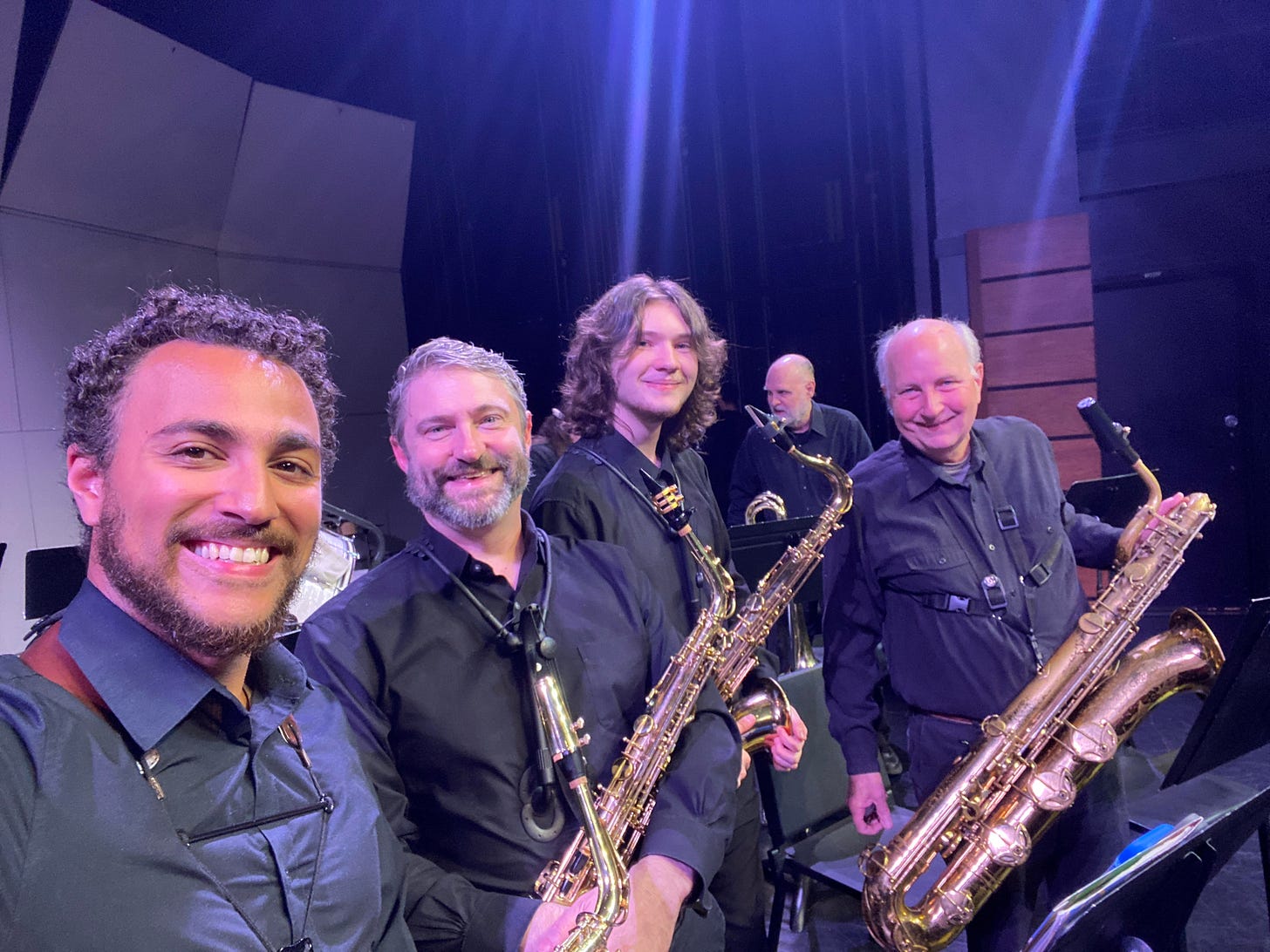Over the weekend, I traveled with the Portland Saxophone Ensemble to the North American Saxophone Alliance (NASA) Region 1 conference in Moscow, ID. We were there to perform my piece Breathe, Set, Play and an arrangement of Arturo Marquez’ Danzon No. 2, but we got as much from the other performances, masterclasses, and conversations as we did being up on stage.
A favorite part of the weekend was the masterclass given by legendary saxophone pedagogue Dr. Debra Richtmeyer who repeatedly exhorted the students and the audience (full of musicians) alike to form a clear idea of what the music you’re playing should express and then craft each element of your performance in service of that expression - from the phrasing of one measure to the dynamic terracing of climaxes across a piece of music. Some of the other ideas Dr. Richtmeyer shared have already made it into saxophone studio classes across the region:
As I’ve said, my favorite part of these conferences is the collegiality - the sense of mutual support and interest and desire to share with and learn from one another. It makes for a wonderful and encouraging environment that breeds more of itself. And at least for me it provides a positive and healthy motivation to work on my own musicianship.
In the spirit of sharing and of mutual support and appreciation, before the performance of Breathe, Set, Play, I got the chance to talk about how the music itself pays homage to one such member of our community:
The Portland Saxophone Ensemble then delivered a lively performance of the piece.
The entire NASA Region 1 conference at the University of Idaho was a treat. Students and professors from all corners of the region (from Missoula to Eugene and Boise to Seattle) consistently impressed with their performances, compositions, and kind thoughtfulness in conversation—heartening when ours feels like a region musically forgotten amidst the power houses in the midwest, south, and northeast.
At the end of the conference, I serendipitously ran into the students from the University of Washington, my alma mater. We traded conference impressions, snapped a photo to send to our teacher Dr. Michael Brockman (UW’s saxophone instructor), and talked excitedly about attending Tim Salzman’s (Director of Bands at UW) upcoming retirement concert in June.
A moment for Mark
Yet, at the center of the Portland Saxophone Ensemble and our performance I still acutely felt an absence: our bass saxophonist Mark Deffebach, a long-time pillar of the Portland jazz saxophone community, passed away suddenly and unexpectedly just weeks before our performance at NASA.
When I moved to Portland 11 years ago, Mark was one of the first musicians I got to know when I joined the Portland Wind Symphony.

Community groups can be full of people who don’t touch their instrument outside of the rehearsal room. But that wasn’t Mark; he was a student of music for life: during one of our last conversations, he enthusiastically shared a young jazz musician/composer’s YouTube page whose way of explaining harmony was opening up new pathways for his own approach to improvisation; he had recently purchased a bass saxophone and learned to master some of its peculiarities so he could bolster the groups he was a part of; his wife told me that in the week before his passing, he had been excitedly making preparations to travel with the Portland Saxophone Ensemble to perform at NASA and learn from the masterclasses and improvisation workshops.
My favorite thing about Mark was his kindness and the quality of full attention and enthusiasm he gave when he was speaking with you, shown not only in the way you could see his lively intellect move across his face while in conversation, but in the incisive and encouraging questions he would ask to draw you further out—something I find exceedingly rare in people today (myself included).
He was also a big supporter and champion of the people around him. He was a fan of this newsletter, frequently pulling me aside to talk about what I had written and going out of his way to find opportunities for me to get my music performed locally - including using his connections with The Portland Ballet to try to get dancers and choreographers to put on a performance of my Suite from a Non-Existent Ballet.
This is at best a 2-dimensional picture of who Mark was. Outside of music, he was an incredibly valued member of Portland’s community of physicians in ways I can’t speak to. And he has also raised and nurtured a family full of talented, high-performing, and values-driven people.
I will (continue to) miss Mark. He has given so many so much. It was more than enough, and so much more than many give. But I know he had more that he was doing and that he wanted to do.
We could each stand to be more like Mark: give the immensely valuable gift of your undivided attention whenever you can; be enthusiastic about something and strive to do it well; and find ways to celebrate and take care of the people around you.










Shane, thank you for sharing your thoughts about Mark. I hadn’t heard that he passed. It’s a bit of a shock. He was a very kind man with whom I always felt safe and seen. As well as a great musician!